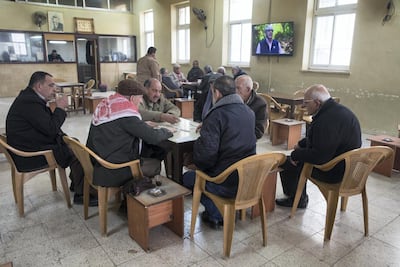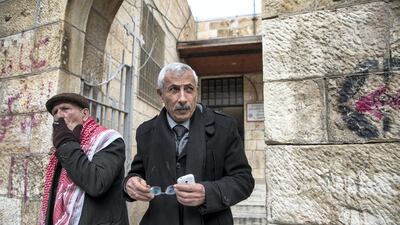A Greek flag flies above the spire of Jalal Barham’s church in Beit Sahour, a small Christian village next to Bethlehem in the Israeli-occupied West Bank.
Mr Barham, 65, is a member of the Greek Orthodox Church, the largest Church in Israel and the Palestinian Territories.
The Church is his everything – his job as a local leader and his source of spiritual, religious and social fulfilment.
But he and many other Palestinian parishioners are frustrated with the Greek Orthodox Church’s leadership, which has been secretly selling land to Israel and stifling the church’s Palestinian character.
“The biggest issue we are facing with this Patriarch is the selling of land in Israel’s interest,” Mr Barham said. “Because we know as Palestinians that the conflict between us and Israel is about the land.
“We are struggling for reform of the church and of the Patriarch – to free the church from Greek dominance over the Church and its money and administration.”
That a God-fearing Palestinian would be in open revolt against his revered church and its leadership shows the many interrelated conflicts shaping life for Palestinians today.
The Greek Orthodox Church of Jerusalem dates to the lifetime of Jesus and his disciples.
It is the second largest landowner in Israel and the Palestinian Territories. It owns about a third of Jerusalem’s Old City and holds the deed to the land on which the Israeli Knesset, or Parliament, is built.
The Orthodox Church in Jerusalem was an important part of early Christianity.
But over time, while Orthodox Churches in various countries gained their independence – such as the Russian Orthodox Church having a Russian patriarch, a Russian flag, and Russian as the church’s main language – the Palestinian church remained dominated by Greek leadership because of Jerusalem’s centrality.
Over recent decades, Palestinian church members have organised conferences calling for changes in their church leadership.
They have made demands: more Arabic-speaking priests, more Palestinian priests, fewer restrictions on those priests advancing, and more Church money going back to the local communities.
But Mr Barham lamented that the Greek leadership has not listened.
Instead, as Palestinian parishioners were demanding their own national church, the Greek Orthodox Patriarch of Jerusalem was selling or issuing long-term leases of land to Israel.
That was despite the fact that the Palestinians are locked in a struggle with the Israelis for statehood and the division of Jerusalem as a shared capital city.
The controversial land deals have come to light in waves over recent years. One document attributed to an internal sector of the Church recorded at least 20 plots of land or property sold or leased over the last 10 years, earning the church more than $100 million, The Washington Post reported.
For Palestinian parishioners, the land sales felt like a double betrayal. Their own church was selling land to their rival and they were not benefiting, said Ghassan Munayer, a member of the Greek Orthodox Church in Ramla, an Israeli city south of Tel Aviv.
“This land and property is to support the local Christian community to stay and keep living in Jesus’s land,” said Mr Munayer, who is originafeltlly from Lod in Israel, home to a historic Orthodox Church dedicated to St George.
“This is exactly not what's happened through the years. They did not use the money to prevent, for example, the migration of the Christian community.”
Mr Munayer said the church should be supporting young couples to buy their first homes or continue their education.
Instead, he said, community members watched as people left the Greek Orthodox Church for other churches where they feel more comfortable.
They even left Israel and the Palestinian Territories because they could not live the life they wanted, burdened by the region’s economic, security and political problems.
The number of Christians across the Middle East has dropped dramatically over the past 50 years.
Mr Barham estimates there are now about 130-150,000 Christians in Israel, about 55-60,000 of whom are Orthodox, while there are another 47,000 Christians in the West Bank and Gaza, 27,000 of whom are part of the Orthodox Church.
According to a study by Bethlehem University, 11 per cent of the population of Ottoman Palestine, which included present-day Israel, Gaza and the West Bank, were Christian in 1900.
That has now dropped to about 1.7 per cent.

Mr Barham said there were no figures for how many people had left the Greek Orthodox Church for another church in the region, although he and Mr Munayer said the more recent growth of other, smaller churches in Christian communities was an important indicator.
The Greek Orthodox Church leadership, and some of its Palestinian parishioners, have adamantly denied the accusations.
"Everything we have done is with approval of the synod but there are individuals who have their own agenda to attack us and slander us," the Greek Orthodox Patriarch of Jerusalem, Theophilos III, told The Washington Post in 2017.
“We are a religious institution with a spiritual mission here for more than 2,000 years.”
The Patriarch defended the sales, arguing it was necessary to sell the land to pay off the Church’s debts and ensure its future after bad previous investments.
He ousted his predecessor in 2005 over the latter’s support for many deals, although more land sales have since come to light.
He has also denied knowing that some of the ultimate owners were Jewish Israeli settler groups with the stated goal of Judaising Palestinian communities in Jerusalem.
Church officials have said that in some cases the Israeli government, which issues the visas for priests, has seized or pressured the patriarch to sell the land or lease it long term.
Under Ottoman rule, some families gave up ownership of their land to the church to avoid paying high taxes, said Mr Munayer, whose family was among them.
Some community members who fled or were ejected from their homes with Israel’s founding in 1948 also handed over their land to the church for safekeeping.
Along with donations from pilgrims and the local communities, the Greek Orthodox Church had been able to acquire significant and coveted properties.
All of this, now, is starting to change. The Israeli Knesset is set to reconsider legislation that would allow the government to seize land sold by the church to private developers.
Legislators say it is necessary to stabilise the market for these properties, but others within the church see this as another way for the state to control historically Palestinian land.
In response to the sales, Greek Orthodox Church members have organised protests. They have thrown eggs and rubbish at the Patriarch of Jerusalem during Christmas processions, called for his resignation and filed a lawsuit contesting some of the sales. Others have called for unity.
“We have to face together what might come,” said Abu El Walid Dajani, owner of the Imperial Hotel inside Jaffa Gate in Jerusalem where there is a large portrait of the current Patriarch, who Mr Dajani calls a friend.
The Patriarch is appealing against an Israeli ruling upholding the sale of several properties, including the Imperial Hotel, by his predecessor.

